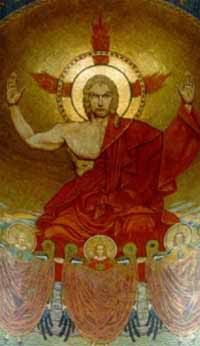It is painful when a fringe Catholic exposes herself... unfaithful and unaware
Here's a woman with access to the media whose Catholic faith is at
an ill formed level. It seems to me that this is the main dilemma with lay
leadership. What process could vet her from causing damage? How could someone
explain to her in terms she would understad that her formation is lacking?
At this stage in her journey she needs remediation, humility, and a
willingness to learn. Instead, she is in the news media, speaking with
confidence, unfaithful and unaware.
link
''Why did God make you?" the catechism asked.
''God made me to show His goodness and to make me happy with Him in Heaven," the catechism taught me.
I had a child's unflinching faith. So did my friend Beth. We both spent the seventh grade in different towns and different parishes praying for the same thing: signs of the stigmata. We longed to be martyrs and saints. We laugh at this now. But it's a wry laugh. What happened to us?
Forty years later a different priest called me a cafeteria Catholic, but not in a mean way. He said it with an understanding born of having said this many times before. But he said it with a warning, too. You cannot choose what to believe if you are a Catholic. You have to believe what the church teaches.
I didn't. And I don't. And I am not the only one.
So here we start. No longer wishing to be a Saint, seemingly proud that she is
not the only one who does not believe what the Church teaches.
And then one day, the moon lit up a man I did follow, a good man and a good priest.
He said, ''God loves us all," and he meant it. He said, ''People are good," and he believed it. He said at the end of every Mass, ''Go and serve the Lord and one another." And he did.
I forgave the church its trespasses because of him. I opened my eyes and saw that there were no longer just altar boys serving Mass. There were altar girls as well. I saw lay people reading. I saw Eucharistic ministers. I saw a community where there once had been a kingdom.
Happy to find that God loves us, she now sees the things important to her..
altar girls,
lay people reading,
Eucharistic ministers,
a flat
community rather than a hierarchal kingdom.
And becuase of the Priest,
or what she selectively heard from him, she has graciously forgiven the Church
its trepasses.
I turned a deaf ear to Rome's dictates about premarital sex, divorce, artificial insemination, and contraception. Yes, the church was against these things, but when I returned, it was to a parish where there was no finger-pointing. This church was holding out its arms.
This deaf ear and blind eye make all things well with her.
Jesus talked to the Samaritan woman at the well, a social breach, unheard of. But he did it anyway. Jesus was best friends with Mary Magdalene, another scandal. Jesus forgave Peter for denying him, and Judas for betraying him, and his Father in Heaven for sacrificing him.
Now this could be a sign of hope. Perhaps the author understands that in these
cases of denial and betrayal, Jesus was also warning them to sin no more. Although Jesus forgiving the Father for "sacrificing" him is a theology I am unaware of.
But without
humility, and a desire to learn, her bent tree is still bent...
The Roman Catholic Church, my church, deems homosexuality a sin. It says that two people of the same gender who love one another and are in a committed relationship are sinners. It says that same-gender couples aren't really couples and are not morally fit to raise children.
But the Roman Catholic Church, my church, also teaches that God loves his creation so much that he sacrificed his only son for all of us.
For all of us. Not just the heterosexuals in the group.
The moon pulls and illuminates. But my church is in the dark.
There you have it. Her verdict is that "my church is in the dark", which I
presume also means that she is in the light... enlightened.
A previous
post about Love
Without Judgement, speaks to the same misunderstanding and pride.
And given what we know about the woman, just how is the Church managing
to exclude her from positions of lay leadership? I think in too many cases, these
sick patients have assumed the role of doctor.




0 Comments:
Post a Comment
<< Home